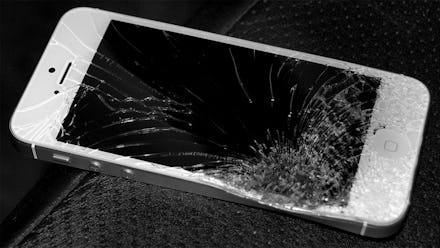France Wants Companies to Admit When They Make Appliances That Break Down Quickly

Andy Rooney, the octogenarian commentator best remembered for his cantankerous, hilarious monologues at the end of 60 Minutes, may have been on to something when he told viewers in 2003, "I had one typewriter for 50 years, but I've bought seven computers in six years. I suppose that's why Bill Gates is rich and Underwood [typewriters] is out of business."
Rooney was talking about the phenomenon known as "planned obsolescence," described by the Economist as "a business strategy in which the obsolescence... of a product is planned and built into it from its conception. This is done so that in the future, the consumer feels a need to purchase new products and services that the manufacturer brings out as replacements for the old ones."
Fortunately for consumers who have had to spend money replacing or upgrading their iPhone or vacuum cleaner every few years, France is fighting back. According to the Associated Press, the country will begin ordering manufacturers to inform consumers about the expected lifespan of products before purchase.
According to the AP, France also plans to roll out measures that would require companies to "replace or repair faulty appliances for free for the first two years after purchase."
If built-in breakdown sounds unfair, you're not alone. In America, the practice of planned obsolescence stretches back to the Great Depression, when economist Bernard London suggested it could help alleviate the effects of the economic collapse by stimulating production. In his 1963 autobiography My Years With General Motors, ex-GM chief Alfred P. Sloan Jr. remarked that changes in new model cars "should be so novel and attractive as to create demand ... [and] a certain amount of dissatisfaction with past models."
In more modern times, even Apple has been accused of planning the eventual demise of its own inventions. The Brazilian Institute of Politics and Law Software sued the tech giant in 2013, demanding a series of fines and reimbursements from the company for building in eventual obsolescence to its growth strategy.
The issue was also raised in the New York Times' "Economix" blog, which, while not pointing a finger directly, could not help but observe that "the iPhone 5S and 5C models coincided with a release of a new iPhone operating system, which happens to make the iPhone 4 and 4S very sluggish. When my iPhone 4 notified me that the operating system was available for download, there was no warning that the software might affect the speed of my model."
"If we think of articles with a shelf life, we know the expiration date," New York University's Peter V. Rajsingh told Mic. Rajsingh, an adjunct professor of finance, was generally supportive of the French consumer protection law, noting that it would help people "be more informed consumers."
If it's such a good idea, does that mean the U.S. will soon be following suit?
"It's unlikely that it would be something that crops up here," said Rajsingh, adding that American cultural attitudes would likely view any stateside proposal as "excessive meddling."
So get in line now, because we're predicting an iPhone 7 that wants to burn a hole in your pocket.